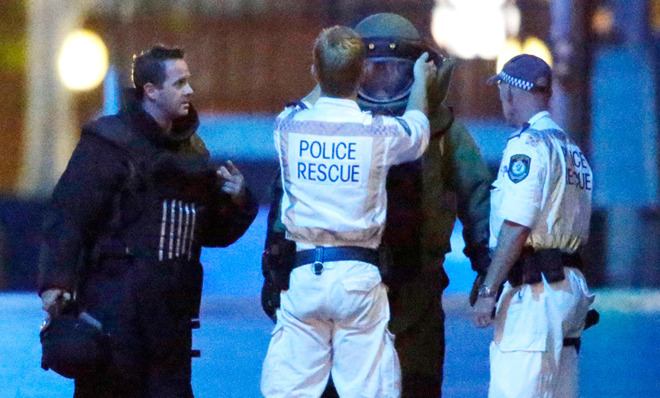As the Sydney siege ends, questions begin
If it turns out that the siege had its root in radical Islam, then it would be the first such successful operation of its type on the Australian mainland

A free daily email with the biggest news stories of the day – and the best features from TheWeek.com
You are now subscribed
Your newsletter sign-up was successful

Police have now confirmed that the siege in Sydney has ended but questions about how it happened, what the motives were, and how Australia should respond will continue for some time.
The man who held up to 30 people hostage in a cafe in the central business district has been identified as Man Haron Monis, an Iranian refugee who moved to Australia in 1996. Monis is already on bail after being accused of being an accessory to the murder of his former wife and faces numerous sexual assault charges.
At this stage it is not clear whether Monis was acting alone, as part of a larger terrorist cell, or indeed whether he was simply using the symbols and language of radical Islamists to gain attention for himself. We must, therefore, tread with great caution.
The Week
Escape your echo chamber. Get the facts behind the news, plus analysis from multiple perspectives.

Sign up for The Week's Free Newsletters
From our morning news briefing to a weekly Good News Newsletter, get the best of The Week delivered directly to your inbox.
From our morning news briefing to a weekly Good News Newsletter, get the best of The Week delivered directly to your inbox.
But what is clear is that this gunman was attempting to associate himself with Islamic State and has, in the past, sent offensive letters to the families of soldiers who fought in Afghanistan.
The Australian intelligence services have known for some time that there has been an increased risk of a terrorist incident occurring. The threat of an attack was raised to "high" as recently as September. It now appears that the prime minister, Tony Abbott, was correct to argue that there are some Australian residents and citizens who "would do us harm."
The location of the siege may be of great significance. The Lindt Café is located opposite Channel 7's studios, and a stone's throw from the Reserve Bank of Australia and the New South Wales Parliament. If this transpires to be a terrorist incident — and that is still a large "if" — then it is one that would strike at the very heart of Australia. It would be a mistake to assume that the relative geographical isolation of the country has afforded Australia a degree of immunity from terrorist incidents in the past.
Indeed, it has suffered several atrocities. The Port Arthur Massacre in 1996 led John Howard to introduce some of the most stringent firearms legislation in the western world. The Bali bombings of 2002 and 2005 have equally left their mark.
A free daily email with the biggest news stories of the day – and the best features from TheWeek.com
Nevertheless, if it turns out that the siege at the Lindt Café has at its root a radical Islamist motive, then it would be the first such successful operation of its type on the Australian mainland.
If such an event can happen in the central business district, where 99 CCTV cameras are in operation, this incident will certainly raise questions about wider security in Australia.
More from The Conversation UK...
-
 Political cartoons for February 16
Political cartoons for February 16Cartoons Monday’s political cartoons include President's Day, a valentine from the Epstein files, and more
-
 Regent Hong Kong: a tranquil haven with a prime waterfront spot
Regent Hong Kong: a tranquil haven with a prime waterfront spotThe Week Recommends The trendy hotel recently underwent an extensive two-year revamp
-
 The problem with diagnosing profound autism
The problem with diagnosing profound autismThe Explainer Experts are reconsidering the idea of autism as a spectrum, which could impact diagnoses and policy making for the condition